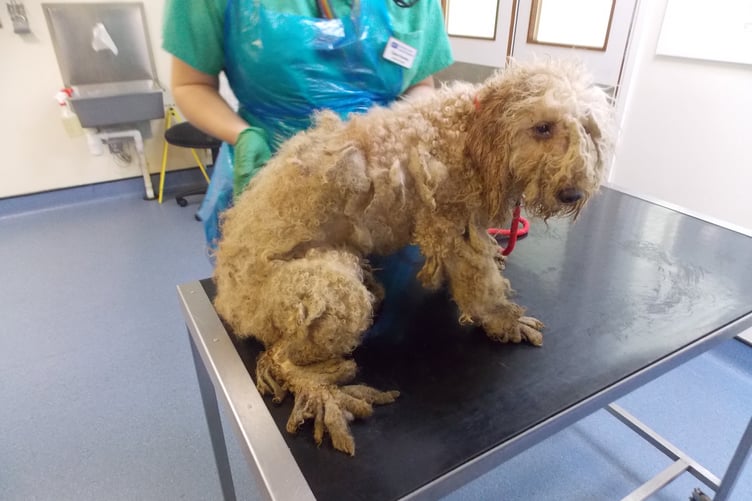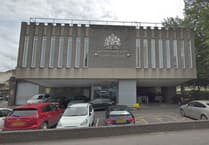A WEST Wales woman has been banned from keeping animals for 10 years after 30 poodles were found in a poor state.
The poodles were found in a poor environment with matted coats, with the owner failing to ensure the needs of 30 dogs were met - with all but one found to be suffering.
The poodle type dogs were found living in a poor environment overloaded with dog faeces and with severely matted coats, by the RSPCA and Pembrokeshire County Council dog warden Sally Bland in September last year.
They were subsequently taken into RSPCA care and following a veterinary check were transferred to RSPCA centres, RSPCA branches, and another rescue charity for boarding.
Twenty-three dogs were signed over to the RSPCA and permission was given by the owner for the remaining seven dogs to be removed and boarded.

Alison Denise Silk, 67, of Camrose, Haverfordwest, appeared at Haverfordwest Magistrates’ Court on 25 January and pleaded guilty to four offences under the Animal Welfare Act.
They were that she caused unnecessary suffering to 20 poodle dogs by failing to provide adequate nutrition for the animals’ needs, caused unnecessary suffering to five poodle dogs, by failing to provide veterinary treatment for severe dental disease, and caused unnecessary suffering to 29 poodle dogs by failing to provide any or adequate grooming.
Sentencing took place on Tuesday 20 February at Haverfordwest Magistrates’ Court, and Silk was handed a disqualification order, banning her from keeping any animal for 10 years.
She was also handed a 26 weeks custodial sentence which was suspended for 12 months for the three unnecessary suffering offences and she was handed a 16 week custodial sentence which was suspended for 12 months for the fourth offence. These will run concurrently.
Silk was also ordered to undertake 10 rehabilitation days with the probation service and the seven dogs that had not been signed over have now been placed into the ownership of the RSPCA. She was also ordered to pay a victim surcharge of £154.
Silk appeared unrepresented at court. The District Judge recommended that advice was available from the duty solicitor but this was not taken. In her mitigation she told the court she was sorry and spoke about her family circumstances and health issues.
A statement provided to the court from RSPCA inspector Keith Hogben, who attended the Haverfordwest property on 4 September last year, said as he entered the front door, he could smell “a very unpleasant smell of dog faeces and urine”.
Inspector Hogben added: “The door to the kitchen was closed and as the door was opened a large number of dogs greeted us, the dogs were all barking and each of the dogs were heavily matted.”
He was next shown in a conservatory. “The room was very hot with dogs in cages and large amounts of faeces both fresh and trodden into the floor,” he said. “Any bedding in the dog cages was soiled and there was no water in this room for any of the dogs.
“Again the dogs in this room had heavily matted coats which were contaminated with faeces. I did not see any windows open. We were then shown to the dog's at the rear of the property that were kept in two dog runs.
“The back garden was covered with dog faeces of various ages and had obviously not been cleaned for many weeks/months, by the door to the conservatory was a wheelbarrow with dog faeces in it.”
There were eight dogs all with heavily matted coats with no water in the first kennel and there were two rabbit type feeding bottles on the bars of the run which were both empty.
Inspector Hogben said: “Inside the kennel was a large amount of faeces and hardly any bedding in the sleeping area, just a couple of plastic dog beds.
“In the other dog kennel were five male dog's all with matted coats and again no access to water, this kennel also had two rabbit type water bottles on the bars but both were empty.
“There was a large build up of faeces in this kennel which had not been cleaned out for a very long time. The door to the kennel could not be opened fully due to the build up of faeces. These dog's were then let out by Alison Silk and they started to drink from a bucket containing green coloured water.”
A vet who attended confirmed that all the dogs would need to be removed due to their body conditions and their environment.
A witness statement was provided to the court by a vet who examined the 30 dogs at RSPCA Merthyr Tydfil Veterinary Clinic, between the 5 and 7 of September 2023.
She said: “The dogs all had severe matting over the majority of their bodies with faeces and urine within the matts and a very strong smell of faeces and urine, with the exception of one who showed signs of being recently groomed but still had heavy matting on one leg (with faeces in), his tail (with faeces in), and the tip of his prepuce (with urine in).
“Another dog had some small clip patches indicating a partial attempt at grooming but was still heavily matted including one ear being matted to the side of his head.
“Three of the male dogs - had a matt directly over the opening of their prepuce, meaning they were always urinating into the matt and unable to exteriorise their penises, and one had urine-soaked matting on his prepuce that, when removed, revealed an area of urine scalding.
“Many of the dogs had large matts under their chins soaked in water, as they were unable to drink without dipping the matts in water.
“Seven of the dogs had live fleas seen when examined. All dogs apart from one were underweight, with four scoring 1/9 on a body conditioning scale and 16 scoring 2/9.”
Many of the dogs were in need of medical procedures, the court heard.
The vet added: “Twelve had severe dental disease and were likely in need of teeth extractions. Seven others had at least moderate dental disease and would benefit from having their teeth cleaned and assessed under a general anaesthetic.
“Seventeen had signs of ocular disease such as inflammation of the conjunctiva, hair loss around the eyes and inflammation of the periocular tissues, or discharge from one or both eyes.
“Many had matts hanging over their eyes and a few had matts formed between hair on their upper and lower eyelids on at least one eye, partially holding their eyes shut. The most likely cause of the eye issues seemed likely to me to be local irritation from the matts or the level of faeces and urine in the environment, but I cannot rule out an infectious cause.”
It was heard that all dogs had flea treatment applied and were wormed and vaccinations were also given.
The vet added: “Where possible, fur was clipped to allow better movement and comfort, as the level of matting in almost all of these dogs was severe enough that it was limiting joint movement and the heaviness of the matts would be pulling on the skin and causing discomfort.”
Further grooming was then carried out at animal centres and boarding establishments.
Five young male and one female poodles went to Greenacres Animal Rescue for rehoming, with the others taken into the care of RSPCA centres and RSPCA branches for rehoming. Sadly one dog was put to sleep on welfare grounds.
The final seven dogs who following the hearing have been signed over to the RSPCA will now be rehomed.
Following the hearing, inspector Hobgen, said: “We would like to thank everyone who was involved in this case, especially Pembrokeshire County Council dog warden Sally Bland, Greenacres Rescue, a number of RSPCA branches, and the member of the public who reported this incident.”




Comments
This article has no comments yet. Be the first to leave a comment.